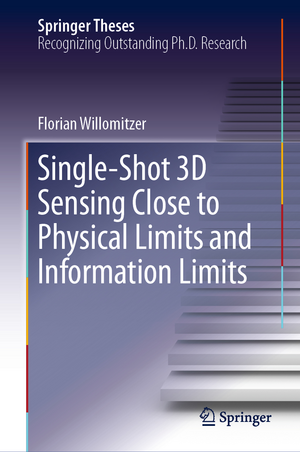Single-Shot 3D Sensing Close to Physical Limits and Information Limits: Springer Theses
Autor Florian Willomitzeren Limba Engleză Hardback – 16 iul 2019
The introduced single-shot 3D video camera, designed for macroscopic live scenes, displays an unprecedented quality and density of the 3D point cloud. The lateral resolution and depth precision are limited only by physics. Like a hologram, each movie-frame encompasses the full 3D information about the object surface and the observation perspective can be varied while watching the 3D movie.
Din seria Springer Theses
- 18%
 Preț: 997.88 lei
Preț: 997.88 lei -
 Preț: 389.88 lei
Preț: 389.88 lei - 15%
 Preț: 646.94 lei
Preț: 646.94 lei - 18%
 Preț: 943.43 lei
Preț: 943.43 lei -
 Preț: 399.29 lei
Preț: 399.29 lei - 18%
 Preț: 944.99 lei
Preț: 944.99 lei - 15%
 Preț: 636.80 lei
Preț: 636.80 lei - 18%
 Preț: 941.05 lei
Preț: 941.05 lei - 15%
 Preț: 643.16 lei
Preț: 643.16 lei - 15%
 Preț: 642.68 lei
Preț: 642.68 lei - 18%
 Preț: 1103.62 lei
Preț: 1103.62 lei - 20%
 Preț: 558.82 lei
Preț: 558.82 lei - 18%
 Preț: 1112.30 lei
Preț: 1112.30 lei - 18%
 Preț: 944.19 lei
Preț: 944.19 lei - 18%
 Preț: 1109.92 lei
Preț: 1109.92 lei - 18%
 Preț: 1217.27 lei
Preț: 1217.27 lei - 15%
 Preț: 640.06 lei
Preț: 640.06 lei - 15%
 Preț: 636.45 lei
Preț: 636.45 lei - 15%
 Preț: 640.06 lei
Preț: 640.06 lei - 15%
 Preț: 640.88 lei
Preț: 640.88 lei -
 Preț: 389.70 lei
Preț: 389.70 lei - 20%
 Preț: 563.89 lei
Preț: 563.89 lei -
 Preț: 393.35 lei
Preț: 393.35 lei - 15%
 Preț: 637.93 lei
Preț: 637.93 lei - 15%
 Preț: 641.85 lei
Preț: 641.85 lei - 18%
 Preț: 1225.94 lei
Preț: 1225.94 lei - 20%
 Preț: 551.36 lei
Preț: 551.36 lei - 18%
 Preț: 1229.10 lei
Preț: 1229.10 lei - 15%
 Preț: 639.25 lei
Preț: 639.25 lei - 18%
 Preț: 999.45 lei
Preț: 999.45 lei - 15%
 Preț: 640.06 lei
Preț: 640.06 lei - 18%
 Preț: 1220.45 lei
Preț: 1220.45 lei - 18%
 Preț: 1116.26 lei
Preț: 1116.26 lei - 18%
 Preț: 1110.72 lei
Preț: 1110.72 lei - 18%
 Preț: 1000.87 lei
Preț: 1000.87 lei - 18%
 Preț: 891.17 lei
Preț: 891.17 lei - 15%
 Preț: 640.06 lei
Preț: 640.06 lei - 5%
 Preț: 1154.07 lei
Preț: 1154.07 lei - 15%
 Preț: 635.96 lei
Preț: 635.96 lei - 15%
 Preț: 640.88 lei
Preț: 640.88 lei -
 Preț: 387.20 lei
Preț: 387.20 lei - 18%
 Preț: 1109.92 lei
Preț: 1109.92 lei -
 Preț: 385.25 lei
Preț: 385.25 lei -
 Preț: 385.25 lei
Preț: 385.25 lei - 18%
 Preț: 1112.30 lei
Preț: 1112.30 lei - 18%
 Preț: 999.45 lei
Preț: 999.45 lei -
 Preț: 386.99 lei
Preț: 386.99 lei - 15%
 Preț: 637.13 lei
Preț: 637.13 lei - 20%
 Preț: 554.20 lei
Preț: 554.20 lei - 20%
 Preț: 555.57 lei
Preț: 555.57 lei
Preț: 641.53 lei
Preț vechi: 754.74 lei
-15% Nou
Puncte Express: 962
Preț estimativ în valută:
122.77€ • 127.40$ • 102.62£
122.77€ • 127.40$ • 102.62£
Carte tipărită la comandă
Livrare economică 17-31 martie
Preluare comenzi: 021 569.72.76
Specificații
ISBN-13: 9783030109035
ISBN-10: 3030109038
Pagini: 139
Ilustrații: XVIII, 174 p. 90 illus., 79 illus. in color.
Dimensiuni: 155 x 235 mm
Greutate: 0.45 kg
Ediția:1st ed. 2019
Editura: Springer International Publishing
Colecția Springer
Seria Springer Theses
Locul publicării:Cham, Switzerland
ISBN-10: 3030109038
Pagini: 139
Ilustrații: XVIII, 174 p. 90 illus., 79 illus. in color.
Dimensiuni: 155 x 235 mm
Greutate: 0.45 kg
Ediția:1st ed. 2019
Editura: Springer International Publishing
Colecția Springer
Seria Springer Theses
Locul publicării:Cham, Switzerland
Cuprins
Preface, Scope of Work and Summary of Results.- Basics.- State of the Art: The Basic Principles of Optical 3D Metrology.- Introducing the Problem.- Solving the Problem with an Additional Source of Information.- Physical and Information Theoretical Limits of the Single-Shot 3D Movie Camera.- Further Improvements of the Single-Shot 3D Movie Camera.- Algorithmic Implementations.- Results.- Comments, Future Prospects and Collection of Ideas.- Summary and Conclusion.
Textul de pe ultima copertă
This thesis discusses the physical and information theoretical limits of optical 3D metrology, and, based on these principal considerations, introduces a novel single-shot 3D video camera that works close to these limits. There are serious obstacles for a “perfect” 3D-camera: The author explains that it is impossible to achieve a data density better than one third of the available video pixels. Available single-shot 3D cameras yet display much lower data density, because there is one more obstacle: The object surface must be “encoded” in a non-ambiguous way, commonly by projecting sophisticated patterns. However, encoding devours space-bandwidth and reduces the output data density. The dissertation explains how this profound dilemma of 3D metrology can be solved, exploiting just two synchronized video cameras and a static projection pattern.
The introduced single-shot 3D video camera, designed for macroscopic live scenes, displays an unprecedented quality and density of the 3Dpoint cloud. The lateral resolution and depth precision are limited only by physics. Like a hologram, each movie-frame encompasses the full 3D information about the object surface and the observation perspective can be varied while watching the 3D movie.
The introduced single-shot 3D video camera, designed for macroscopic live scenes, displays an unprecedented quality and density of the 3Dpoint cloud. The lateral resolution and depth precision are limited only by physics. Like a hologram, each movie-frame encompasses the full 3D information about the object surface and the observation perspective can be varied while watching the 3D movie.
Caracteristici
Nominated as an outstanding Ph.D. thesis by the University Erlangen-Nürnberg, Erlangen, Germany Presents a novel single-shot 3D video camera that works close to the theoretical limits of optical 3D metrology Exploits "holographic" principle to improve vastly on currently available single-shot 3D cameras
